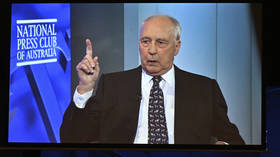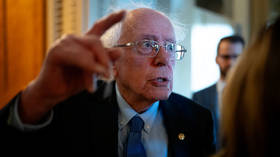Why Western conservative parties are heading for populism or disintegration

The Liberal Party of Australia – a traditional conservative party akin to the Republican Party in the US and the Conservative Party in the UK – is currently in a state of acute crisis, a situation not dissimilar to the instability experienced by most conservative political parties in the West over the past few decades.
Formed in the late 1940s, the Liberal Party, in coalition with the smaller and ultra conservative National Party (representing the agricultural sector) has governed Australia for most of the post-World War II period.
Last year, the coalition lost the federal election to the Labor Party (Australia’s other major party) thereby ending an almost unbroken decade in power. In the recent New South Wales election, the Liberal-led government was defeated by Labor after a similar period in office.
The Labor Party currently governs federally, in five of the six Australian states, and in both territories.
How did the electoral demise of the Liberal Party come about? Why is a once dominant party seemingly incapable of winning an election anywhere in the country? Does the Liberal Party have a viable future? These questions, and the answers, raise significant issues relating to the future of conservative parties and liberal democracy in the West.
Straying from conservative principles
The Liberal Party’s decline has generated a great deal of angst-ridden discussion within the party, as well as the Murdoch media empire – the party’s long-standing loyal promoter and spin doctor.
The general consensus is that the Liberal Party’s decline is the result of its having strayed from its true conservative principles, by adopting politically correct ideologies that the party should have been openly and rigorously attacking.
Some disenchanted Liberals go so far as to suggest that the party should re-embrace the conservative values of Robert Menzies, the founder of the Liberal Party, and prime minister from 1949 to 1966.
However, this is rank self-delusion. Menzies was committed to the White Australia policy, preserving the British Empire, and defending the policy of apartheid in South Africa. It is difficult to see what Menzies has to offer the modern Liberal Party, which is probably why he resigned in 1966 and was resolutely ignored by the party in his retirement.
It is similarly misguided to suggest that a traditional conservative party hoping to attain office in its own right can openly attack the politically correct ideologies that currently prevail in Western liberal democracies. To do so would be to alienate significant segments of the electorate – without whom success would be impossible.
The suggested remedy of a simple ‘turn to the right’ – without more substance – for the Liberal Party is a recipe for electoral oblivion.
Internal division
Any astute analysis of the current Liberal Party crisis must commence by acknowledging that the party has been racked by internal division for decades, and this is a major cause of its current predicament.
Even a cursory glance at Liberal Party history over the past two decades makes clear that the party comprises two bitterly opposed factions.
First, the conservatives – professing religiously based traditional conservative values such as opposing same sex marriage and transgender rights, dubious about climate change and supportive of fossil fuels, Thatcherite in their economics and representing the interests of small business. Additionally, they are strongly pro-Britain and pro-US in foreign policy, while rabidly anti-China. Tony Abbott, the prime minister from 2013-15, was the former leader of this faction, and Peter Dutton, the current Liberal leader, is its wavering standard bearer at present.
Second, the moderates – socially progressive, embracing the #MeToo movement and transgender rights, for example. They are firmly committed to tackling climate change and advocates for renewable energy, Keynesian in their economics and representing the interests of global economic interests. They are also more pragmatic in respect to foreign policy and China. Malcolm Turnbull, the prime minister from 2015-18, was the former leader of this faction.
Culture wars that really aren’t
Over the past 20 years, seemingly endless battles have taken place between these two factions for control of the Liberal Party. Each side has had victories – all of which were pyrrhic and inconclusive. Turnbull deposed Abbott as sitting prime minister in 2015. Turnbull himself was then overthrown as prime minister in a coup led by Dutton in 2018, which installed Scott Morrison as a compromise prime minister.
So fratricidal was the factional infighting within the Morrison government in its latter stages that it was incapable of passing key legislation, including Morrison’s divisive Religious Freedom Bill, and moderate MPs regularly threatened to cross the floor and vote with the Labor opposition. Not surprisingly, the Morrison government was voted out of office in the May 2022 election.
Liberal Party strategists play down the importance of the two factions while maintaining a ‘we are a broad church’ rhetoric. Meanwhile, they refuse to acknowledge that the factions represent two distinct economic interest groups – the older nation state-based elites and the new global elites that have emerged since the 1970s as the globalization of the world economy has gathered momentum.
The economic interests and agendas of these two groups are diametrically opposed to each other. Ideological open warfare has broken out between them over the past 20 years as the new globalized economy has progressively displaced the older nation state based economic order.
This ideological conflict has been termed the ‘culture wars’ – which conservatives persist in seeing as mere differences of opinion on matters of social policy that can be resolved by rational debate. In fact, the culture wars are a conflict between competing ideologies that legitimize two radically different economic world orders. They cannot be resolved by discussion because the new global elites are committed to imposing their worldview in a neo-totalitarian fashion, such as by ‘canceling’ those who think differently.
The fundamental dilemma confronting all conservative political parties in the West is that it is only conservative parties that have attempted to simultaneously represent the interests of these two irreconcilably opposed economic groupings. That is why only conservative parties continue to be plagued by fierce ideological internal division.
Fighting imaginary Marxists
It is a measure of conservative politicians’ complete lack of insight into the revolutionary global economic and ideological transformation that has engulfed and divided them. They foolishly persist in categorizing globalist politically correct ideologies as ‘left-wing’ or, even more inaccurately, ‘Marxist’.
That is utter nonsense. These ideologies legitimize the interests of extraordinarily powerful global economic elites, which is why they have been able to so easily infiltrate and dominate virtually all important institutions within Western liberal democracies, including the media, universities and schools, large corporations, bureaucracies, and the political process itself.
No wonder conservatives have so comprehensively lost the culture wars – they have been fighting Karl Marx when they should have been joining battle with the elite attendees at Davos.
Traditional left-wing ideologies, of course, promoted socialism and/or the redistribution of wealth away from economic elites towards the working class.
The West’s current dominant ideologies legitimize the status and increasing wealth of the new global economic elites, who exhibit absolute contempt for those that have been impoverished by the process of globalization – including the traditional working class.
This lack of understanding by conservatives is compounded by their refusal to acknowledge that traditional left-wing progressive parties – the Labor Party in Australia, Labour in the UK, and the Democrats in the US – have, over the past 50 years, transformed themselves into parties that now, almost exclusively, represent the interests of the new global elites.
No ideological divisions now exist within these formerly progressive parties – simply ideological mopping-up exercises in which old-style socialists like Jeremy Corbyn and Bernie Sanders are finally drummed out of the party for good.
This ideological unity, together with increased support from the now-dominant globalized economic interests, explains the current electoral success of the Labor Party in Australia, the Democrats in the US, and the upcoming electoral victory of Keir Starmer’s Labour Party in the UK.
This has escaped the notice of Liberal politicians in Australia – who have been preoccupied with their own internal battles for decades. Unbelievably, there are many Liberals who genuinely believe that Labor Prime Minister Albanese is a socialist.
Losing both the rich suburbs and the working class
The Liberal Party’s recent political failures have come about because the party has lost two distinct categories of seats.
First, seats in wealthy inner-city suburbs populated by the new global elites and their hangers-on. Second, seats in outer, formerly working-class suburbs, whose residents have been hardest hit by stagnant wages, increasing energy prices, and rising inflation – the fruits of globalization.
As to the first category, Liberal moderates have been defeated in these seats by a new political force – the so-called ‘Teal independents’. The term ‘Teal’ derives from the light blue coloring of their election propaganda. The Teals are wealthy members of the global elites – for the most part young women – lavishly funded by venture capitalists and renewable energy magnates. Promoting radical climate change policies, women’s rights, and anti-corruption measures, the Teals have won a raft of formerly safe Liberal seats by cleverly demonizing the Liberal conservative faction and arguing that the moderates in the party are incapable of delivering on their promises.
As to the second category, these seats have turned against the Liberal Party because of its longstanding opposition to wage and salary increases for ordinary workers – which has led voters in groups to believe that the Liberal Party will do nothing for them.
If these electoral trends persist – and there is no reason to doubt that they will – the Liberal Party, in its current manifestation, has no realistic prospect of regaining these seats.
Trying to appease the ‘progressives’
Last week, a further bout of destructive infighting broke out within the party over The Voice – a controversial Labor Party proposal, born of identity politics, to create a constitutionally enshrined Aboriginal political body that will advise the federal parliament and government.
A referendum is to be held later this year in which voters will decide whether to radically amend the constitution so as to create this powerful new arm of government. Prime Minister Anthony Albanese has made The Voice his pet project and has skillfully transformed it into a classic ‘culture wars’ issue. Rational debate has been shut down and anyone opposing The Voice runs the risk of being canceled.
Peter Dutton recently announced that the Liberal Party would oppose the creation of The Voice, and this decision bound all shadow cabinet members, although other Liberal MPs were free to vote according to their conscience.
This week, shadow Attorney General Julian Lesser, a prominent leader of the moderate faction, resigned from the shadow cabinet and announced that he intended to campaign in favor of The Voice.
Greg Sheridan, writing in The Australian, described Lesser’s action as “a savage blow against the Liberal Party” which, given the party’s current state of crisis, is something of an understatement. Lesser’s act of betrayal will further weaken the party – and it confirms that the divisions within the Liberal Party have only intensified since last year’s election defeat.
How did the Liberal Party leadership respond to Lesser’s treachery?
In an extraordinary statement, Sussan Ley, the deputy leader of the party, said that she “admired Lesser’s moral principles” and predicted that he would be a minister in a future Liberal government. If any further evidence of the party’s feebleness and complete lack of resolve to deal with the crisis were needed, Ley’s pathetic statement provides it.
Lesser’s defection confirms that the Liberal Party in its current form has no viable future.
Salvaging the conservative future
The party can carry on as it is – hopelessly divided and lurching from crisis to crisis – in which case it will become progressively more irrelevant and eventually disappear.
Alternatively, in partnership with the ultra-conservative National Party, it can transform itself into a populist party, in which case it may have a future.
Such a populist transformation would, however, have to entail the expulsion of the entire moderate faction. It would also necessitate a radical reorganization of the party’s policy settings, away from protecting the interests of small business and towards representing those voters in the outer suburbs who have been left behind by the process of globalization. These people have no prospect of owning a home in the capital cities, can no longer afford big city rents, and are struggling to pay their energy and food bills.
Whether the Liberal Party has the courage and ability to effect such a fundamental transformation is an open question. It certainly will not come about under the party’s current leaders, and it may be that the National Party will have to provide the necessary leadership.
As with so much else, it is Donald Trump who has been the harbinger of the future for conservative political parties in the West.
Populism or death?
Trump personally transformed the Republican Party into a populist party, in which moderate Republicans were stripped of power and influence – thereby saving it from political oblivion, and bringing it extraordinary success.
Some traditional conservative parties in other countries that have not moved in a populist direction have simply disappeared such as in France and Italy – only to be replaced by powerful populist parties that either have, or are on the verge of, attaining power.
Boris Johnson attempted to refashion the UK Conservatives along populist lines – implementing Brexit and promising to look after those impoverished by globalization with his ‘leveling up’ program – but Johnson’s salvage operation ended in failure. As a result, the deeply divided Conservative Party in Britain is headed for a crushing defeat in the next general election.
So-called progressive political leaders in the West delight in the demise of traditional conservative parties. They ignore the grave dangers that the political instability inevitably produced by the rise of populist parties pose to the future of liberal democracy – even though Trump’s destructive antics since losing the 2020 election have put the writing on the wall.
These leaders are completely oblivious to the consequences of the destruction of the social democratic consensus that has operated effectively in most Western countries for more than a century. This consensus integrated the working class into these societies and gave them a measure of prosperity, all within a liberal democratic political framework based on a two-party political system, one conservative and one protecting working class interests.
It was this arrangement that provided most Western societies with an extraordinary degree of political and social stability for the entire 20th century.
Thatcher and Reagan began the dismantling of this consensus in the 1980s, and it gathered momentum under so-called progressives like Tony Blair and Bill Clinton.
Their successors, Keir Starmer and Joe Biden, now openly do the bidding of the new global elites that are resolutely determined (much more so than Thatcher or Reagan ever were) to carry through the destruction of this consensus to finality – irrespective of the political consequences.
The demise of traditional conservative parties in the West is just one symptom of this process of ongoing destruction that has intensified over the past decade.
More likely than not, the Liberal Party in Australia will disappear and be replaced by a populist party of some kind as is happening in other Western countries. But this is not something to welcome or celebrate as the globalized elites and the so-called progressive political leaders that now act exclusively on their behalf seem to believe.
Rather, because it is a dramatic warning sign of the impending collapse of liberal democracy in the West, it is something to regret.
The statements, views and opinions expressed in this column are solely those of the author and do not necessarily represent those of RT.


















